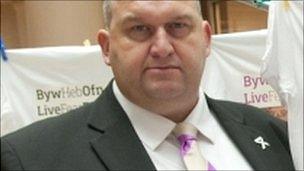Communities First: Employment support funding announced
- Published

Local Government Minister Carl Sargeant said the aim was to boost support for parents of under fives
The Welsh government has announced extra funding to boost support for job seekers in the most deprived areas.
More than £450,000 is being made available so that Jobcentre Plus can work with Communities First projects.
The money will be targeted to help workless families, particularly lone parents.
It is the one of the first developments to help support the new Communities First clusters announced last year.
The project, which will benefit from £452,648 worth of total funding, is based on a similar pilot scheme that Jobcentre Plus ran between 2010 and 2012.
Local Government Minister Carl Sargeant says that tackling poverty "requires a range of organisations to work together".
"The project will deliver local support to parents with children aged under five and also strives to identify and support those parents who are the hardest to reach that are living within the community.
"We are also considering how this work can in future support work to reduce the number of people who are not in education, employment, or training."
Major shake-up
The Communities First programme was set up in 2001 to help people living in some of the most deprived areas of Wales to regenerate their neighbourhoods.
Over the past 10 years more than £300m has been spent by the partnerships trying to improve the health, education and quality of life of people in concentrated areas such as community wards and housing estates.
But following a series of critical reports the programme is undergoing a major shake-up, with fewer but bigger projects being created.
Concerns have been raised about the impact of the changes that will see about 150 projects being reduced to 52 "cluster" areas and annual spending cut by £5m to £40m.
The first 12 of the 52 clusters were announced in November 2012, including four in Caerphilly, four in Cardiff, one in Gwynedd, one in the Vale of Glamorgan and two in Flintshire.
It is expected that the remaining clusters will be revealed by the end of the month.
- Published14 November 2012
- Published8 October 2012
- Published12 June 2012